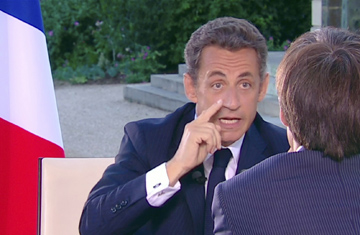
France's President Nicolas Sarkozy, seen in this video grab, appears during a prime time news interview with journalist David Pujadas on France2 television in the garden of the Elysee Palace in Paris July 12, 2010.
In an attempt to reverse the tide of scandal-driven news that has rocked his government over the past few weeks, French President Nicolas Sarkozy took to primetime TV on Monday night and did what he does best when faced with a challenge: he came out counterpunching, accusing his political opponents and the media of conspiring to undermine his painful yet necessary reform program. That tactic has been effective in the past. But this time Sarkozy's pugnacious denunciation of his rivals — claiming they fabricated scandal and unfounded allegations to sap the government's public support — struck many observers as insincere and unjustified. The tirade even led some who watched the one-hour nationwide broadcast to openly question whether the President has lost touch with the reality of his rule.
"The President, Scarcely A Credible Victim," read a headline in Tuesday's daily Libération." "Victim: victim of a conspiracy, victim of the recession," mused Socialist Party leader Martine Aubry on Radio France Inter. "Victim, even, of the French people, who don't understand what needs to be done." Those kinds of negative reactions are to be expected from well-known Sarkozy opponents and left-leaning newspapers, but Tuesday morning discussions on radio and TV talk shows, as well as between commuters in the Metro, indicated that many who watched the broadcast felt the President's counterattack was oddly out of sync with the public's perception of his government.
As Sarkozy denounced the "lies" and "calumny" he said were being directed at himself and his cabinet to derail the controversial pension reform planned for the autumn, his attempts to wave off a growing scandal that has ensnared Labor Minister Eric Woerth, struck some as beyond flippant. Last week, a former accountant for L'Oréal heiress Liliane Bettencourt testified to investigators that Woerth received around $190,000 in cash from Bettencourt in 2007 to be used as funding for Sarkozy's victorious presidential campaign that year — an alleged amount that would have violated both French limits on donations and requirements that they be accounted for. Woerth denies ever having gotten any illegal donations — much less cash-stuffed envelopes — from Bettencourt or anyone else. (The ex-accountant told police that media reports quoting her as saying Sarkozy also pocketed envelopes of cash were fabricated.) On Monday, Sarkozy's statement of support for Woerth — and his accusations that the scandal had been cooked up to damage Woerth's standing as the point man for Sarkozy's controversial reform, which will extend retirement age from 60 to 62 — left some people incredulous. Sarkozy's "advice" that Woerth step down as the Union for a Popular Majority party's treasurer — something Woerth says he'll do — also struck many observers as too little, too late, given the enormity of the scandal.
Though Sarkozy intended his TV appearance to focus mainly on his reform drive, the furor sparked by Woerth's links to the Bettencourt affair forced him to spend 15 of the 60 minutes on air discussing the saga. And that wasn't the only scandal that hung over his Monday night broadcast. In June, a wave of media reports revealed that some highly paid and big-spending officials were living well thanks to taxpayer money, news that infuriated belt-tightening French voters. By the time several embarrassing discoveries of such misuse of expenses provoked two ministerial resignations earlier this month, some pundits wondered whether those departures weren't just a decoy to take heat off Woerth. A poll published July 5 found that 64% of respondents think their politicians are "rather corrupt".
